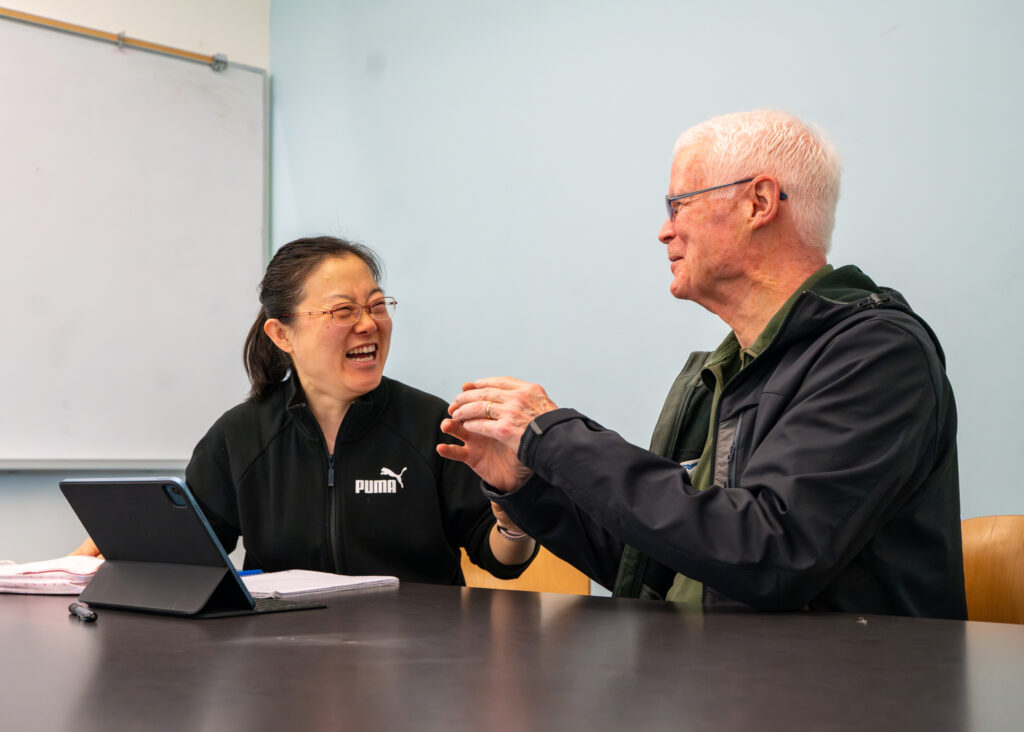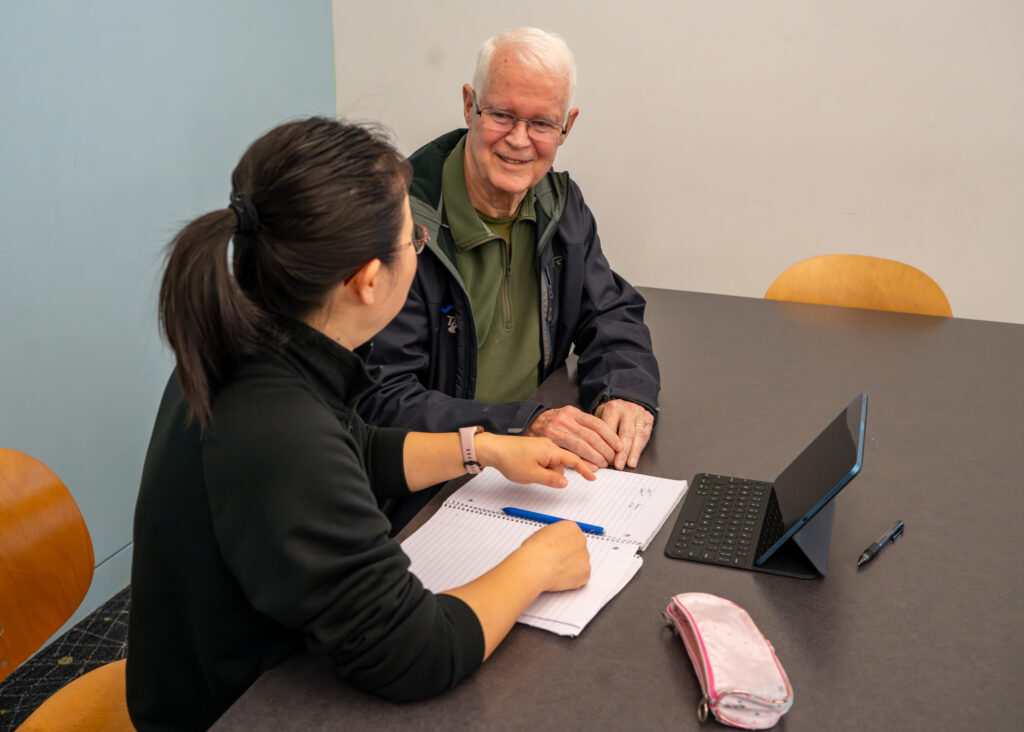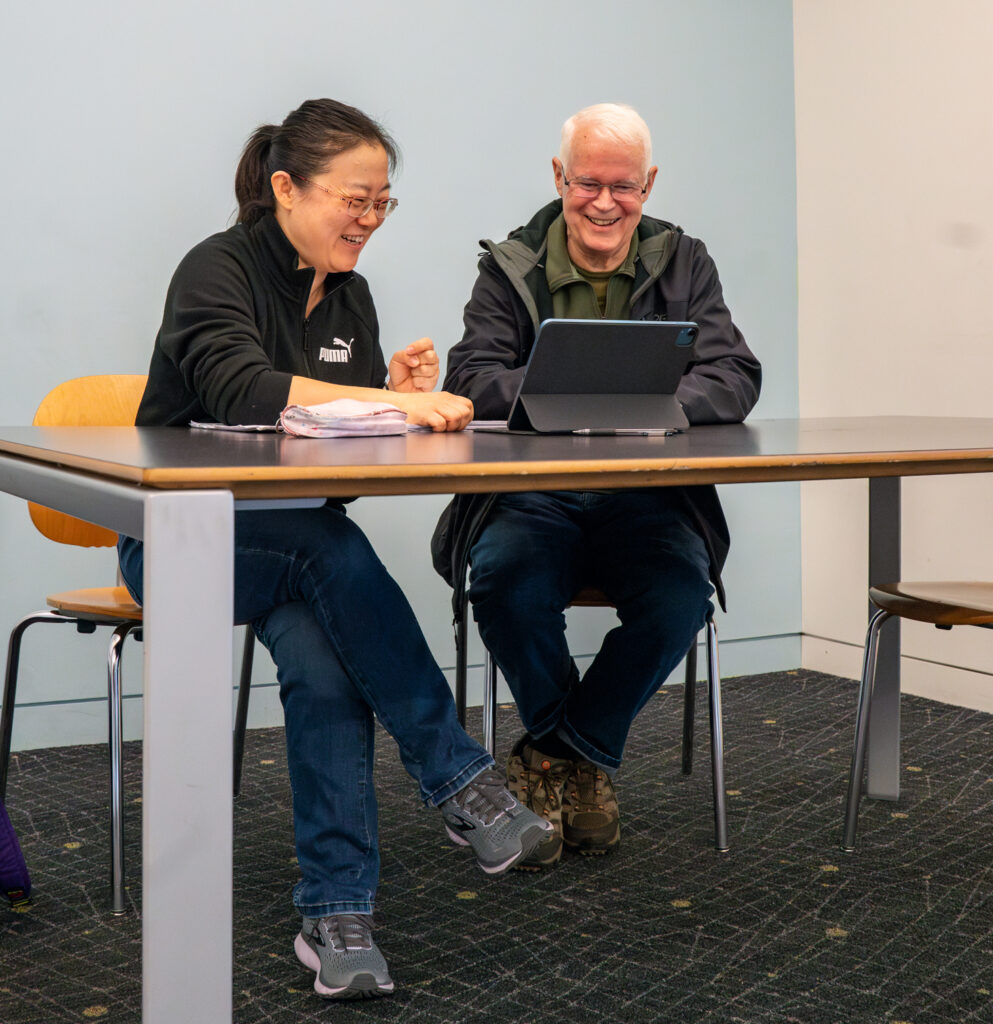Volunteer Spotlight: Bob Webster

According to the current Census Survey Data, in 2021, more than 60 million Americans volunteered through an organization, contributing $122 billion in economic value. At Hopelink, volunteers are more than just their financial value. They add to the Hopelink experience through the relationships they build with clients, creating memorable moments of joy for many families experiencing poverty. It’s about meeting families where they are, and then adding to their experience through kindness and compassion. Bob Webster is a volunteer in Hopelink’s Adult Education program and has volunteered with Hopelink’s Food Markets for 15 years and counting! The stories he shares, and the friendships he’s built speak to this value.
Hopelink: Let’s start with the basics. Tell us a little about yourself.
Bob Webster: So, I was born in New York City. I stayed there until I was 22 and went into the Navy where I spent four years of my career. Then, I went to work for a company that worked internationally doing construction and engineering and worked for them for 30 years. I traveled all around the world, across six continents. Because of my work overseas, I realized I enjoy learning and visiting diverse cultures. When I retired full time 20 years ago, I moved out here to Seattle to be near two of my daughters. I’ve got four kids and six grandkids now, and we love living in the Seattle area.
That’s an impressive resume, Bob! After moving to the Seattle area, how did you first get connected with Hopelink?
BW: I was looking for volunteer opportunities and had tried some other opportunities. To me, looking for the perfect volunteer opportunity, you’ve got to look for three things. First, you look for an organization that is doing something that you believe is worthwhile and is doing it efficiently. The second thing you look for is something you’re going to enjoy; volunteering should be fun. And the third thing is, are you going to be good at it, because you might enjoy it, but not be good at it. So, I tried volunteering at other organizations, but I really didn’t feel like it was a good fit. But Hopelink did. When I volunteer at Hopelink I feel comfortable. I feel like they do things that are valuable, and they do them well. They give community members support and have fun with it. I really enjoy it.

You mentioned your world travels earlier, can you tell us how that experience lends itself to volunteering with Hopelink?
BW: A couple of ways. It’s always been fascinating for me to experience cultures. I’ve worked in a lot of different countries, and in my line of work at the time, I began asking myself…How can I fit in and be a good citizen of the country I’m in? So that was always fun. Then, when I began working with Hopelink clients I realized I was working with a lot of cultures the same way I did in my career. I started keeping track to see how many different countries clients I’ve worked with have come from, I got up to 25 and counting! It just goes to show you Hopelink clients really come from all over the world. That’s why I think it was a good fit for me here. I’ve really come to appreciate people that come here and bring their young families, or come by themselves, or they’re older. That takes a lot of courage to come into a new country you don’t know and fit in. And so, I just admire people that I partner with, and it feels good knowing I’m one little part of their journey.
Can you tell me a little more about those experiences working with clients at Hopelink? Was it ever challenging to make a connection with them given their diverse backgrounds?
BW: As an advisor in the English for Work program, you work with clients over a couple of months. The biggest barrier clients believe they face is not feeling like their command of the English language is good enough for them to find work. Many clients only interact with their own community, so they don’t have anybody to practice their English-speaking skills. One day, a client asked if he could keep in contact so we could continue practicing his skills. I said “Yeah, we can keep talking,” because the end of the course doesn’t mean the end of the connection.
But to be honest, sometimes it goes beyond that. For example, this morning, I had a conversation with a previous student from Vietnam. He was telling me about his difficulties in applying for citizenship. Later, that same morning, I talked to another fellow from Armenia. He wanted to practice his English, because he has nobody to practice with. He’s trying to improve his skills for the new job he has. It’s common for students to finish the course, get a job, and then not need to talk to me anymore. But some of them want to keep talking. I have a meeting tomorrow in the library with someone I worked with probably five years ago, and she’s still trying to improve her English, so I enjoy that very much. After so much time you eventually begin forming friendships.

It sounds like you get a lot of value out of the culture sharing experience while volunteering at Hopelink. What would you say are some other benefits to volunteering?
BW: One of the biggest benefits of volunteering is all the learning you do. Once I had a Chinese student that wanted to talk about the Gaokao, which is the big, once-a-year university entrance examination. I learned so much about how important it is in China, and how folks study and prepare for it. That’s one of the biggest advantages of volunteering at Hopelink is that you work with people from all over, so I am constantly learning. I’ve likened this to being able to see other cultures without having to leave the country. Another benefit is that my willingness to learn about another culture gives me and the client more to talk about. The clients and I are always looking for topics to continue the conversation.
If someone asked you why it’s important to volunteer, what would you tell them?
BW: I think that volunteering, especially when you’re in retirement, is a great way to be active and social. I didn’t expect to get so much back out of it. I’ve done some other volunteer opportunities before I joined Hopelink, and while there was a lot of good work I was doing, I didn’t get the same feeling of satisfaction that I get with Hopelink.
The other thing I really appreciate about Hopelink is that, you know, a lot of organizations, they’ll take volunteers and throw them out there, but Hopelink supports you. They get somebody that they’ll train you and they’re always there if you have a question. I feel comfortable asking for help and I always feel like somebody’s got my back.
To learn more about volunteering at Hopelink, click here! To learn more about other ways to get involved, visit our Take Action page!
